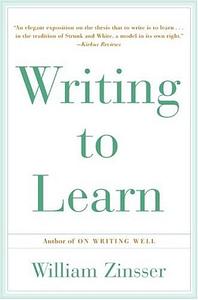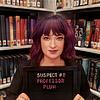Take a photo of a barcode or cover
53 reviews for:
Writing to Learn: How to Write - and Think - Clearly About Any Subject at All
William Zinsser
53 reviews for:
Writing to Learn: How to Write - and Think - Clearly About Any Subject at All
William Zinsser
informative
inspiring
lighthearted
medium-paced
The needed start for myself to use writing to reinforce my learning
informative
slow-paced
informative
inspiring
reflective
medium-paced
I bought this book after seeing a video on youtube about learning or writing or something similar recommend it. For the first half or so, I quite enjoyed it. Up until the last ~20 pages was a bit of a slog, during which I often felt frustrated and let down by the book. I was hoping for something more prescriptive and felt an undue amount of pagespace was devoted to quotes that were analyzed, along with indulgent autobiographical reflections that got boring. I put the book down for months, then decided to finish the last bit up. The last part was very enjoyable and satisfying, and I will probably read Zinsser's similarly themed On Writing Well sometime. For people like me, this book may be best digested a chapter at a time, with some space in between to allow the ideas to marinate and the content to feel fresh again when returning to it. Ultimately this book has helped motivate me to write more.
Disappointing, but had some good parts. While I hoped the book would examine the actual process of "writing to learn," it instead gave excerpts from exemplary works in various fields. The chapter on writing about math was particularly bad, since no good example was given, only the ramblings of seventh-graders trying to complete their homework.
hopeful
informative
reflective
fast-paced
Really usefell. I liked the author's sensitivity without deminishing the practical uses of the craft. Anthropology mentioned
The statement "Writing is Thinking" is a truth I feel I have always known, uncovered by William Zinsser through this book and it's fascination with great writing's ability to teach in both directions.
Meh. I don't know that this was worth my time to read, but it was okay.
informative
slow-paced
About six years ago I spent such a happy afternoon in the Melbourne library, reading Zinsser's On Writing Well (similar in style and content to Strunk and White's Elements of Style), I was happy to pick up another of his books when it came my way. The opening chapters were exciting: Zinsser wrote well about the pains and rewards of writing, and made an eloquent case that society (especially the educated, business class) has gone to the dogs by way of 'office-speak' and 'bureaucratese.' He even convinced me that writing should be taught 'across the curriculum;' in other words, math students should write about math. Economics students should write about economics. Not only does our culture need good, clear writing about all subjects, but people learn best from their subject if they write about it. Writing, he pleaded, is organized thought. Of course, he was preaching to the choir.
But, the book fell flat. The remaining chapters were devoted to samples of other people's writing, organized by category (the arts, sciences, etc.). Thing is, except for only an exception or two (you know Rachel Carson, the envronmentalist? The woman can write!), none of his examples wrote as well as Zinsser himself does. Toward the end, I found myself skipping the samples in favor of Zinsser's clever, albeit brief, commentaries.
Here is one passage in which I took great heart:
"Only when the job was over did I enjoy it. I don't like to write, but I take great pleasure in having written-- in having finally made an arrangement that has a certain inevitability, like the solution to a mathematical problem. Perhaps in no other line of work is delayed gratification so delayed."
But, the book fell flat. The remaining chapters were devoted to samples of other people's writing, organized by category (the arts, sciences, etc.). Thing is, except for only an exception or two (you know Rachel Carson, the envronmentalist? The woman can write!), none of his examples wrote as well as Zinsser himself does. Toward the end, I found myself skipping the samples in favor of Zinsser's clever, albeit brief, commentaries.
Here is one passage in which I took great heart:
"Only when the job was over did I enjoy it. I don't like to write, but I take great pleasure in having written-- in having finally made an arrangement that has a certain inevitability, like the solution to a mathematical problem. Perhaps in no other line of work is delayed gratification so delayed."
I enjoyed the examples of writing from various fields, but I was more interested in the idea of figuring out what you know through the writing process.


